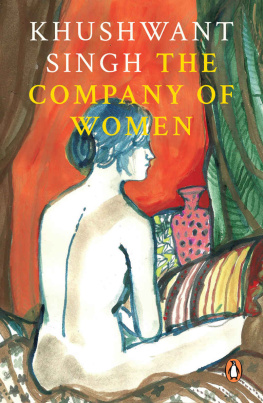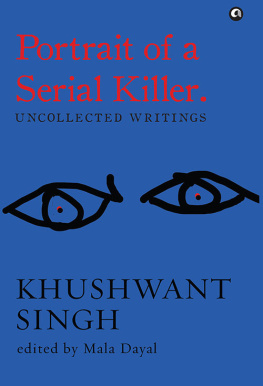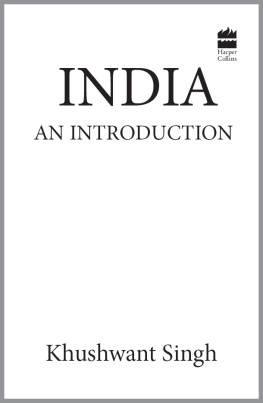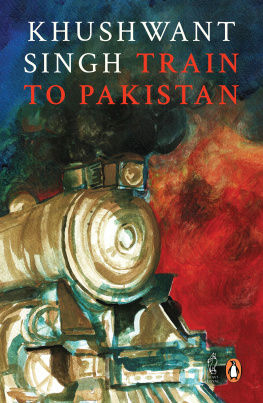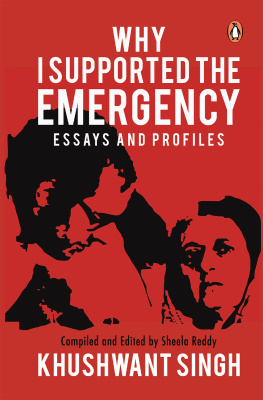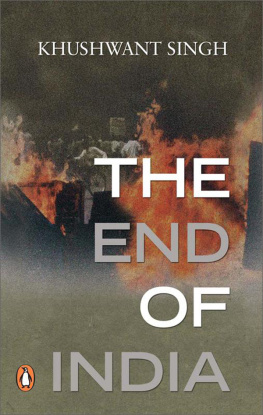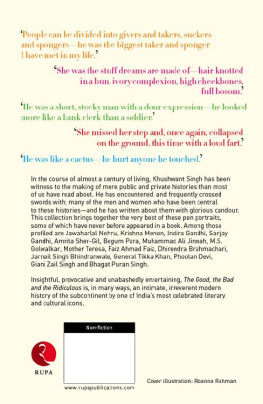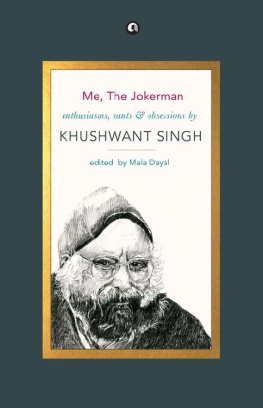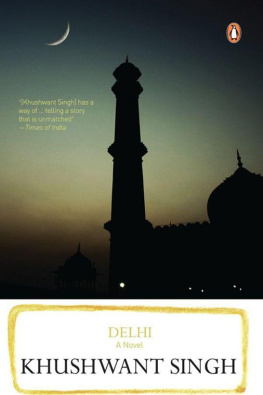Khushwant Singh - The Company of Women
Here you can read online Khushwant Singh - The Company of Women full text of the book (entire story) in english for free. Download pdf and epub, get meaning, cover and reviews about this ebook. year: 0, genre: Business. Description of the work, (preface) as well as reviews are available. Best literature library LitArk.com created for fans of good reading and offers a wide selection of genres:
Romance novel
Science fiction
Adventure
Detective
Science
History
Home and family
Prose
Art
Politics
Computer
Non-fiction
Religion
Business
Children
Humor
Choose a favorite category and find really read worthwhile books. Enjoy immersion in the world of imagination, feel the emotions of the characters or learn something new for yourself, make an fascinating discovery.
- Book:The Company of Women
- Author:
- Genre:
- Year:0
- Rating:3 / 5
- Favourites:Add to favourites
- Your mark:
- 60
- 1
- 2
- 3
- 4
- 5
The Company of Women: summary, description and annotation
We offer to read an annotation, description, summary or preface (depends on what the author of the book "The Company of Women" wrote himself). If you haven't found the necessary information about the book — write in the comments, we will try to find it.
The Company of Women — read online for free the complete book (whole text) full work
Below is the text of the book, divided by pages. System saving the place of the last page read, allows you to conveniently read the book "The Company of Women" online for free, without having to search again every time where you left off. Put a bookmark, and you can go to the page where you finished reading at any time.
Font size:
Interval:
Bookmark:



PENGUIN BOOKS
Khushwant Singh was Indias best-known writer and columnist. He was founder-editor of Yojana and editor of the Illustrated Weekly of India, the National Herald and Hindustan Times. He authored classics such as Train to Pakistan, I Shall Not Hear the Nightingale (retitled as The Lost Victory) and Delhi. His last novel, The Sunset Club, written when he was ninety-five, was published by Penguin Books in 2010. His non-fiction includes the classic two-volume A History of the Sikhs, a number of translations and works on Sikh religion and culture, Delhi, nature, current affairs and Urdu poetry. His autobiography, Truth, Love and a Little Malice, was published by Penguin Books in 2002.
Khushwant Singh was a member of Parliament from 1980 to 1986. He was awarded the Padma Bhushan in 1974 but returned the decoration in 1984 in protest against the storming of the Golden Temple in Amritsar by the Indian Army. In 2007, he was awarded the Padma Vibhushan.
Among the other awards he received were the Punjab Ratan, the Sulabh International award for the most honest Indian of the year, and honorary doctorates from several universities.
Khushwant Singh passed away in 2014 at the age of ninety-nine.

Mohan Kumar

For Mohan Kumar, it should have been a day of rejoicing. It was not.
He had looked forward to it for twelve years. His wife had at long last decided to leave him: despite the months of bitter acrimony that had preceded it, she agreed to give him a divorce provided she had custody of their two children. He was so anxious to get his freedom, that besides the children he agreed to give her whatever else she wanted in the way of alimony: jewellery that he and his father had given her, furniture, picturesanything she named. She wanted nothing. She seemed as eager to get rid of him as he was to get rid of her. That afternoon she had packed her things and driven away with the children to her parents home. She had not bothered to say goodbye. The children sensed that this was not just another visit to their grandparents. They embraced and kissed him before running out to get into their mothers black Mercedes. The car had shot out of the gate with unnecessary speed; she had made sure the children would have no time to turn around and wave goodbye.
Mohan should have been celebrating his newly won freedom from his nagging, ill-tempered wife. But as he sat in the balcony of his double-storied bungalow, his feet resting on the railing, smoking a Havana cigar, he felt empty inside and shrouded in loneliness. There was an all-pervading silence. No screaming of children fighting with each other; his six-year-old daughter rushing to him complaining of her elder brothers bullying and he gruffly ordering them to behave and not disturb him. Their squabbles had often irritated him. Now he missed them. The house suddenly had far too many rooms, and the night too many hours. He was weary.
He thought of his relations with his wife. It was what people described as a love-cum-arranged marriage. But of course it was nothing of the sort. The day after he had returned from the States thirteen years ago with degrees in computers and business management, his proud father, a retired middle-level government servant with middle-class dreams for his only son, had gone round newspaper offices with his photographs and biodata. The next morning some national dailies carried Mohans picture in their matrimonial pages, with captions extolling his academic achievements. Enquiries from parents of unmarried girls followed. He and his father were invited to tea, introduced to nubile girls, tempted with large dowries and offers of partnerships in business. Even after all these years Mohan was amazed at how easily he had allowed himself to be offered for sale, finally agreeing to marry Sonu.
Her father, Rai Bahadur Lala Achint Ram, had made the highest bid. He owned a couple of sugar mills and considerable real estate in Delhi. Mohan succumbed to the offer more to please his father than out of any wish to settle down with a wife. Sonu was passably fair, high-spirited and convent-educated. Also a virgin eager to opt out of virginity. They had a lavish wedding and moved into a large furnished flat provided by her father. Mohans father moved in with them. The honeymoon went well, as it usually does with newly married couples who desire little besides the freedom to discover and devour each others bodies. Their first child, a son, was conceived during those early days of amatory exploration.
Differences in temperament began to surface soon afterwards. Sonu was quick-tempered, possessive and wanted attention all the time. She was jealous, though she herself had no love to give him. And she began to resent his fathers presence in their homeher home, for it was, after all, a gift from her father. Will your old man live with us all his life? she once asked in disgust. He did not like her calling his father old man and told her so. I married you, not both of you, she shot back. He realized soon enough that their living arrangements had to change. The garment export business he had started soon after returning from the States was bringing him good money, and he also had enough dollars saved up. Within two months of that unpleasant exchange with Sonu he was able to buy himself a bungalow with a garden in Maharani Bagh, an upper class neighbourhood of Delhi. There was enough space in the new house, and Mohan thought Sonu and his father would be able to keep out of each others way. But he was wrong. His father, sad and diminished, finally moved to Haridwar. This was not how Mohan had wanted it, but at least there might now be peace. He was relieved to be out of the premises provided by his father-in-law.
In less than two years, Mohan had added semi-precious stones and leather goods to the list of items he exported. His profits more than trebled, and soon he was part of the charmed circle of Delhis super rich.
None of this improved his relationship with his wife. She was, he realized with some horror, a bitter woman, incapable of happiness and determined to make him unhappy. She had made up her mind to condemn him in everything he did. If he paid the slightest attention to another woman, she would call him a randy bastard. At first he thought they were going through a period of adjustment and hoped that relations would settle down to normal. In the seventh year of their marriage, they had a daughter. But even this child did not bring them any closer. Quarrels became endemic. Hardly an evening passed without their going for each other, leaving them both utterly exhausted. For many days following a spat they would barely exchange a word. Then bodily compulsions would resolve the dispute. They would have sex, usually loveless sex, and resume talking to each other. Only for a few days.
One evening remained etched in his memory. She overheard him talking to one of his women friends on the phone. She accused him of having a liaison with that whore. She called him a lecher. He lost his temper and slapped her across the face. For a while she was stunned into silence, then hissed, You dared to hit me. Ill teach you a lesson youll never forget. And then she walked out of the house. An hour later she was back with her cousin, an inspector of police, and two constables. Mohan was taken to the police station like a common criminal. His statement was recorded. A couple of hours later the inspector drove him back home. It had cost Mohan Rs 5000 to get the inspector to record that it was a ghareloo maamlaa domestic affairand rafaa dafaa the complaint in the police file. That time Sonu had stayed with her parents for over a month.
Font size:
Interval:
Bookmark:
Similar books «The Company of Women»
Look at similar books to The Company of Women. We have selected literature similar in name and meaning in the hope of providing readers with more options to find new, interesting, not yet read works.
Discussion, reviews of the book The Company of Women and just readers' own opinions. Leave your comments, write what you think about the work, its meaning or the main characters. Specify what exactly you liked and what you didn't like, and why you think so.

